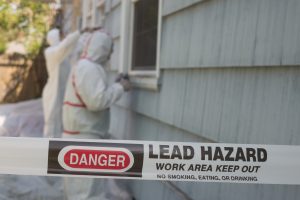HUD awards McHenry County $2M for lead-safe home program
August 30, 2023
Housing built before 1978 is at risk of having lead-based paint present, and as the paint ages it begins to deteriorate (peel, chip, chalk, or crack).
McHenry County has been awarded more than $2 million from the U.S. Department of Housing and Urban Development to remediate lead from homes and correct other health hazards.
The funding will allow McHenry County to assist at least 40 households with young children in removing lead paint. The county will receive $1.86 million in funding to identify and eliminate lead-paint hazards in homes, plus another $170,100 in supplemental funds to help with other housing-related health and safety hazards.
The program is offered at no cost, and includes homeowners, renters and caregiver households in which children spend at least 19 hours a week. Just under 40 percent of the 117,813 housing units in McHenry County were built prior to 1978, when the federal government banned the manufacture of lead-based house paint. Housing units built between 1940 and 1970 tend to pose the greatest lead health hazard.
In order to be eligible, a home must have been built prior to 1978, and must have a pregnant woman or child younger than 6 living in it (or spending a significant amount of time in it). The program is limited to households at or below 80 percent of the area median income for McHenry County; income limits can be found at https://bit.ly/3QMAHmg.
Funding is expected to begin Oct. 1, but McHenry County can work to assist residents with application materials in advance. Eligible residents can contact Michelle Halvorsen at MLHalvorsen@mchenrycountyil.gov, or call 815-334-4088. Residents can learn more about the program by visiting www.mchenrycountyil.gov/leadsafehomes.
Lead, though a naturally occurring element, can have severe health effects on the human body. Housing built before 1978 is at risk of having lead-based paint present, and as the paint ages it begins to deteriorate (peel, chip, chalk, or crack).
Young children, particularly children under the age of 6, are easily exposed to lead dust produced from deteriorating lead-based paint, as the dust tends to settle on floors and can be easily ingested through children’s normal hand-to-mouth behavior.
Depending on the level of exposure, lead has been found to have substantial short-term impacts on the development of young children:
- Behavioral problems and hyperactivity
- Learning disabilities
- Impaired growth
- IQ decline
- Hearing loss
- Red blood cell production issues
- Stomach aches/cramps
- Intellectual disability
- Coma
- Seizures
- Kidney damage
- Anemia
- Death
There are also long-term impacts of lead exposure on both the child’s future and the future of a community:
- Sustaining health problems and increased utilization of medical services
- Learning deficits and need for special education
- Criminal behavior and run-in with law enforcement
- Employment difficulties
All program activities and work is coordinated by Lead Safe Homes Program staff, as well as community partner organizations, who remain in contact with the owners and residents throughout the process.
Each enrolled housing unit is eligible for a maximum of $15,000 in lead grant funds.
The program includes:
- Lead inspection and risk assessment to find lead paint and identify lead paint hazards
- Lead remediation/renovation work to address the lead paint hazards that were found (if any). Addressing hazards could include performing minor repairs involving new windows, doors, siding, trim, exterior & interior painting, porch repair, etc.
In addition to the main grant funds offered for lead hazard remediation/renovation, the program also offers small and discretionary Healthy Homes grants to supplement lead work done in the home. These Healthy Homes grants can be used to identify and address other potential health factors of the home, and to create an overall healthier place to live.
McHenry County was one of 36 governments in 19 states, and the only one in Illinois, to receive a portion of the $140 million in lead and home health grants allocated by HUD.







